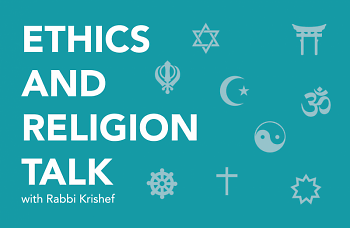This column is the 400th appearance of Ethics and Religion Talk in the Grand Rapids Press since we began on July 31, 2012, almost eight years ago. My initial vision, when creating the column, was to model a kind of respectful interfaith dialogue, in which we clearly articulate what defines us as unique religious traditions without disparaging each other’s faith traditions. The reader, over time, would also see the common threads running through our traditions. We may get to the same answers, in different ways; or we may use the same kind of reasoning, but arrive at very different answers.
My tradition is a textual tradition. I begin with words from Torah, from the Bible, read through the lens of principles found in Talmud or later Jewish writings. You’ll find the same careful exegesis in the responses from the Reverend Ray Lanning, our Reformed Presbyterian colleague, and Father Kevin Niehoff, our Catholic colleague. Nonetheless, on matters of theology, I find myself generally in disagreement with them.
Fred Stella our Hindu respondent, and the Reverend Colleen Squires, responding from a Unitarian Universalist perspective, are less likely to rely on Scripture verses and more likely to appeal to principles of their faith. Even so, on matters of theology I often find that the three of us end up in the same place.
After 400 columns, though, I wonder what kind of difference we’ve made. In the years when Mlive published our column online and invited comments, the discussion was anything but respectful. In the almost three years since we’ve moved to theRapidian.org, the online discussion of the columns has diminished to almost nothing. I know our readership is fairly robust in numbers, but I hear only a handful, most of whom ‘get it.’ I wonder about the rest. I’d love to hear from more of you.
I begin this column around the same time as terrific Grand Rapids Press writer, Charlie Honey, was concluding a 20 year run as the Religion reporter and columnist. I told him that I would consider this a solid success when I’d reached his mark of approximate 1000 weekly columns. I feel good about achieving 40% of my goal, but there is still a lot of work to do! Thank you to all the loyal readers. Keep reading and keep the questions coming.
The Reverend Colleen Squires, minister at All Souls Community Church of West Michigan, a Unitarian Universalist Congregation, responds:
"I am very grateful Rabbi David Krishef created this column, that it continues to thrive and for his kind invitation to me to join the panel a few years ago. I so appreciate the opportunity to share our Unitarian Universalist beliefs and perspective in this way. There are many misunderstandings about our faith that I hope to clarify in my responses. I think I most enjoy the variety of answers. With many of my answers I initially think I will stand way off in left field and yet when I see the various responses, I often note a common thread or kernel across the replies. I learn so much from this column and I am grateful for the opportunities it has given me. What I love most of all is hearing feedback from our readers, I particularly like when I walk my dog and my neighbors come out to to tell me their thoughts about my response!"
Fred Stella, the Pracharak (Outreach Minister) for the West Michigan Hindu Temple, responds:
"It has been an honor to be included with such a deeply passionate cohort of religious leaders in our community. I am always impressed with the thoughtfulness and intelligence displayed by the other panel members.
"It is interesting that Rabbi Krishef picked up on the differences in style among us. I will admit to being impressed by those who support their thoughts with scriptural reference so much more than I do. It is true that even though Hindus do have multiple holy texts, our teaching tradition does not rely very much on chapter-and-verse recitation. It does exist, just not as prevalent. And sometimes I just don’t want to give up my allotted ink space to a phrase that might not mean much to most who are reading the column! But perhaps I should offer a few more examples of sacred writ in the future.
"Let’s hope we can in some ways inspire other communities."
Rev. Ray Lanning, a retired minister of the Reformed Presbyterian Church of North America, responds:
"Rabbi Krishef has created a unique space in the landscape of religious journalism. Seldom do editors give such freedom to their contributors, allowing each one to speak his or her own mind, in terms of the tradition each one represents. He has resisted the temptation to relativize differences or reconcile conflicts by explaining them away. Readers must assess each contribution on its own merits, without coaching or prodding to reach a pre-determined conclusion. As the late Harry Golden might say, 'Only in America' does such freedom of speech or independence of judgment flourish. Long may it continue!"
This column answers questions of Ethics and Religion by submitting them to a multi-faith panel of spiritual leaders in the Grand Rapids area. We’d love to hear about the ordinary ethical questions that come up ina the course of your day as well as any questions of religion that you’ve wondered about. Tell us how you resolved an ethical dilemma and see how members of the Ethics and Religion Talk panel would have handled the same situation. Please send your questions to [email protected].
The Rapidian, a program of the 501(c)3 nonprofit Community Media Center, relies on the community’s support to help cover the cost of training reporters and publishing content.
We need your help.
If each of our readers and content creators who values this community platform help support its creation and maintenance, The Rapidian can continue to educate and facilitate a conversation around issues for years to come.
Please support The Rapidian and make a contribution today.
